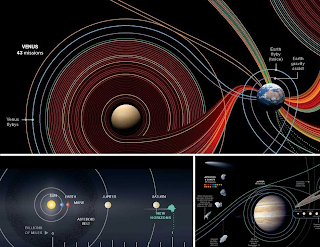Saturday, September 21, 2013
There have been 40 Missions to Mars over the past 50 years. [Infographic]
Credit: Sean McNaughton and Samuel Velasco, National Geographic and 5W Infographics
Almost 200 launches and their destinations detailed in one image.
Full size: http://bit.ly/15LeQi2
Thursday, September 19, 2013
Mars Rover Curiosity Detects No Methane in Martian Gas Samples at Ground Level: Hope of Life on Mars Fades.
Researchers using an unusually sensitive gas detector aboard the Mars Curiosity robot rover reported that they can't find any methane in the thin Martian air, dealing a blow to hopes that life today might be lurking in the soil of the cold, arid world.
"Methane on Mars would be an exciting find because most of the methane on Earth comes from life-related processes," such as microbial activity or organic decay, said planetary scientist Malynda Chizek at New Mexico State University who studies the planet's atmosphere. "Everyone wants to be the one who discovers life on Mars."
Upon the first close inspection at ground level on Mars, however, the crucial methane gas was nowhere to be found by Mars Rover Curiosity.
More Mars probes, including India's first mission to the planet and a $1 billion European effort with Russia, are poised to search for methane there in the years ahead. In light of the new finding, some researchers now doubt these efforts will find any evidence of the life-related gas.
Since 2003, astronomers using Earth-based telescopes and readings from a European satellite orbiting Mars have reported detecting periodic plumes of methane on Mars—up to 50 parts per billion in the air. Although often challenged by other researchers, those readings raised expectations among astrobiologists that microbes might be at work on the planet.
Saturday, September 7, 2013
Mean while back on the planet Earth: Professor Steven Benner "Life on Earth came from elements that arrived from Mars on a Martian meteorite,.”
An element believed to be crucial to the origin of life would only have been available on the surface of the Red Planet, it is claimed. Geochemist Professor Steven Benner outlined his theory that the “seeds” of life probably arrived on Earth in meteorites blasted off Mars by impacts or volcanic eruptions.
All living things are made from organic matter, but simply adding energy to organic molecules will not create life. Instead, left to themselves, organic molecules become something more like tar or asphalt, said Prof Benner told the conference. He described the oxidised mineral form of the element molybdenum, believed to be a catalyst that fostered the development of organic molecules into the first living structures.
“It’s only when molybdenum becomes highly oxidised that it is able to influence how early life formed,” said Prof Benner, from The Westheimer Institute for Science and Technology in the USA. “This form of molybdenum couldn’t have been available on Earth at the time life first began, because three billion years ago the surface of the Earth had very little oxygen, but Mars did. “It’s yet another piece of evidence which makes it more likely life came to Earth on a Martian meteorite, rather than starting on this planet.”
He added: “Certain elements seem able to control the propensity of organic materials to turn to tar, particularly boron and molybdenum, so we believe that minerals containing both were fundamental to life first starting. “Analysis of a Martian meteorite recently showed that there was boron on Mars; we now believe that the oxidised form of molybdenum was there too.”
Study: Life On Earth May Have Started On Mars American Voices • Opinion • ISSUE 49•36 • Sep 3, 2013 5315337According to scientist Steven Benner, conditions on Mars 3 billion years ago were more conducive than those on Earth to creating one of the earliest molecules of life, RNA, and that meteorites may have transported these molecules to Earth’s surface. What do you think?
All living things are made from organic matter, but simply adding energy to organic molecules will not create life. Instead, left to themselves, organic molecules become something more like tar or asphalt, said Prof Benner told the conference. He described the oxidised mineral form of the element molybdenum, believed to be a catalyst that fostered the development of organic molecules into the first living structures.
“It’s only when molybdenum becomes highly oxidised that it is able to influence how early life formed,” said Prof Benner, from The Westheimer Institute for Science and Technology in the USA. “This form of molybdenum couldn’t have been available on Earth at the time life first began, because three billion years ago the surface of the Earth had very little oxygen, but Mars did. “It’s yet another piece of evidence which makes it more likely life came to Earth on a Martian meteorite, rather than starting on this planet.”
He added: “Certain elements seem able to control the propensity of organic materials to turn to tar, particularly boron and molybdenum, so we believe that minerals containing both were fundamental to life first starting. “Analysis of a Martian meteorite recently showed that there was boron on Mars; we now believe that the oxidised form of molybdenum was there too.”
Study: Life On Earth May Have Started On Mars American Voices • Opinion • ISSUE 49•36 • Sep 3, 2013 5315337According to scientist Steven Benner, conditions on Mars 3 billion years ago were more conducive than those on Earth to creating one of the earliest molecules of life, RNA, and that meteorites may have transported these molecules to Earth’s surface. What do you think?
Subscribe to:
Comments (Atom)






